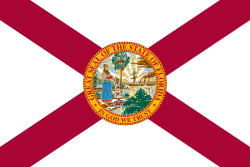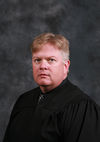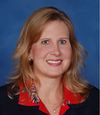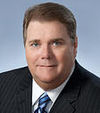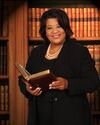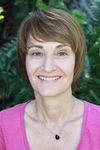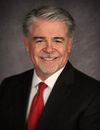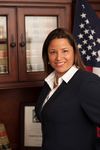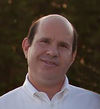JP Election Brief: Spotlight on the Sunshine State
The JP Election Brief | |
|---|---|
| Pulling back the curtain on the drama of judicial elections | |
| In this issue... | |
| |
October 9, 2014
| On November 4, 439 judicial candidates will appear on the Florida ballot. Of those candidates 311 (71%) are incumbents and 263 (60%) will be running unopposed. 22 appellate judges, one out of every three in the state, are running for retention. | ||
|
Crash course on Florida judicial elections
Trial court candidates in Florida compete in nonpartisan elections. Political parties and partisan organizations are not allowed to endorse, support or assist candidates, and candidates are forbidden to personally solicit contributions. However, they are able to establish committees that can raise and spend money. Unopposed candidates for the circuit and county courts do not appear on the ballot but are automatically considered elected after the general election.[1]
Appellate judges must stand for retention, where voters answer a "yes" or "no" question of whether a judge should be retained for another six year term. These judges face no opposition on the ballot, and if they win a majority of "yes" votes they are granted another term on the bench.[2]
County court contests
There are 67 county courts in Florida. Judges in these courts decide on misdemeanors, small claims, civil cases and traffic violations. The number of judges in any particular county court is determined by population and caseload.[3] There were a total of 78 candidates before the August 26 primary election. Of those, 42 (54%) are unopposed. 18 candidates (23%) were defeated in the primary.
Three county court races will be contested on November 4:
- In the Broward County Court, Claudia Robinson will challenge incumbent Ian Richards. Richards first joined the bench in 2008, and Robinson is currently a sole practitioner with her firm the Law Office of Claudia Robinson P.A.
- In the Orange County Court, incumbent Kenneth A. Barlow, Jr. will face Tina Caraballo for his seat. While incumbents usually have an advantage over challengers, Caraballo outpaced Barlow in the primary, garnering 45.1% of the vote to Barlow's 36.4%. This race will be one to watch on November 4!
- Finally, in the St. Lucie County Court, incumbent Kathryn Nelson will compete with Albert B. Moore. Nelson pulled out ahead of Moore in the primary with 48.8% to Moore's 21.6%. Nelson has served on the court since 2005, and in October 2011 was charged with two misdemeanors: a DUI with property damage and resisting arrest without violence. The judge was released on bail, and was eventually pleaded no contest. Nelson was sentenced to one year of probation, DUI school, fifty hours of community service and a $500 fine.
See all the county court candidates here.
Circuit court showdowns
There are 20 circuit courts in Florida. These courts hear felonies, family law, civil cases with over $15,000 disputed, probate issues, juvenile cases and appeals from county courts.[4]
Six circuit courts will have contested races on November 4:
- In the Fifth Circuit Court, incumbent Sandy K. Kautz has been ousted in the primary. Challengers Mary P. Hatcher and Denise A. Dymond Lyn will battle it out in the general election. Hatcher nearly took the victory in the primary but fell short of a majority with 46.5% of the votes. Lyn received 21.3% of the votes in the primary.
- In the Seventh Circuit Court, Adam Warren and Kathy Weston will battle for a vacant seat. Weston was favored by voters in the primary, with 45.3% to Warren's 28.7%.
- There will be two contested races in the Thirteenth Circuit Court this year. In Group Eight, Carl C. Hinson and Barbara Twine Thomas will face off for the vacant seat. The primary was closer with a slight favoring of Thomas, with 42.3% of the vote to Hinson's 32.9%.
- For Group 34 of the Thirteenth Circuit Court, Melissa Polo and Robert Bauman (Florida) are up for the vacant seat. Bauman pulled out ahead in the primary of Polo, receiving 48.0% of the vote to Polo's 29.5%.
- There was another surprising primary upset in the Sixteenth Circuit Court. Incumbent Tegan Slaton lost to challengers Jack Bridges and Bonnie J. Helms. Bridges was elected to serve as a mosquito control commissioner for Monroe County in 2010, and has worked as an attorney since 1999. Helms has been a sole practitioner since 1994 with her firm Bonnie J. Helms, P.A.
- After a close primary, Dennis Bailey and Rhoda Sokoloff are both vying for the vacant position on the Seventeenth Circuit Court. They received 27.44% and 29.14% of the primary vote respectively. Tune in to find out who walks away with the win!
- And last but not least, the Eighteenth Circuit Court will be home to three contested general election races this year. In Group 13, candidates Christina Sanchez and George T. Paulk will compete for the vacancy. Paulk received 48.1% of the vote in the primary and Sanchez received 31.2%.
- Mitch Krause and Susan Stacy are both running for Group 19 on the Eighteenth Circuit Court. Stacy was slightly ahead of Krause in the primary, with 42.1% of the vote to 35.1%.
- After another close primary, John Moser and Nancy Maloney will face off in the general election for Group 23 on the Eighteenth Circuit Court. Moser held an advantage over Maloney in the primary vote, receiving 44.4% to Maloney's 36.5%.
See all the circuit court candidates here.
Appellate court retentions
While there are a handful of county and circuit court races to watch this election, the retentions in the appellate court should prove to be more predictable. 22 judges will be running for retention on November 4, and they have all been recommended for retention by the Florida Bar.[5] A full list of the judges up for retention can be found here.
Florida campaign finance case takes national spotlight
A recent announcement from the U.S. Supreme Court might have a large impact on how future Florida judicial candidates can seek campaign contributions. The U.S. Supreme Court has announced that it will look into a Florida campaign finance case involving a former Hillsborough County Court candidate, Lanell Williams-Yulee. The issue in question is whether judicial candidates should be permitted to personally solicit campaign contributions. The Florida Supreme Court has already ruled in favor of the ban, arguing that it helped to preserve judicial integrity and the public's confidence in the impartiality of the judiciary.
For former judicial candidate Lanell Williams-Yulee, the ordeal began in 2009 when she signed a letter asking potential supporters for campaign contributions. She lost the election and received a reprimand from the Florida Bar for violating the ban on candidates personally soliciting contributions. Attorneys for Williams-Yulee will argue in the U.S. Supreme Court that this ban violates First Amendment rights related to political speech. While the Florida Bar stated in an August brief that it supports the ban, it urged the U.S. Supreme Court to investigate the issue due to the different positions held on the topic by appellate courts throughout the nation.[1]
Ballot measure seeks to speed up gubernatorial appointments
A measure that will be on November's ballot is attempting to alter the method of judicial selection in Florida. Rather than having to wait until a judge's term expires to name a successor, the Florida Prospective Judicial Vacancies, Amendment 3 would permit the governor to appoint a successor when one of three conditions is met:
- a judge approaches mandatory retirement,
- a sitting judge does not qualify for a retention election, or
- a judge loses a retention election.
If passed, the ballot measure could prove beneficial to Republicans in early 2019 if Governor Rick Scott wins re-election this November. Three justices of the Florida Supreme Court have terms expiring on January 8, 2019, due to reaching the age of mandatory retirement, and the ability to appoint successors could be helpful to conservative Florida legislators. The bill passed the Florida House of Representatives and Florida Senate in April 2014. Republicans favored the measure and voting was along party lines.[6]
Gallery of contested races in Florida
| Broward County Court | |
|---|---|
| Orange County Court | |
|---|---|
| St. Lucie County Court | |
|---|---|
| Fifth Circuit Court | |
|---|---|
| Seventh Circuit Court | |
|---|---|
| Thirteenth Circuit Court: Group 8 | |
|---|---|
| Thirteenth Circuit Court: Group 34 | |
|---|---|
| Sixteenth Circuit Court | |
|---|---|
| Seventeenth Circuit Court | |
|---|---|
| Eighteenth Circuit Court: Group 13 | |
|---|---|
| Eighteenth Circuit Court: Group 19 | |
|---|---|
| Eighteenth Circuit Court: Group 23 | |
|---|---|
Federal courts:
Eleventh Circuit Court of Appeals • U.S. District Court: Middle District of Florida, Northern District of Florida, Southern District of Florida • U.S. Bankruptcy Court: Middle District of Florida, Northern District of Florida, Southern District of Florida
State courts:
Florida Supreme Court • Florida District Courts of Appeal • Florida Circuit Court • Florida County Court
State resources:
Courts in Florida • Florida judicial elections • Judicial selection in Florida
See also
Footnotes
- ↑ 1.0 1.1 The Tampa Bay Times, "U.S. Supreme Court to hear former Hillsborough judicial candidate's fundraising issue," October 2, 2014
- ↑ Judgepedia, "Florida judicial elections," accessed October 7, 2014
- ↑ Judgepedia, "Florida County Court," accessed October 7, 2014
- ↑ Judgepedia, "Florida Circuit Courts," accessed October 7, 2014
- ↑ The Florida Bar, "2014 Merit Retention Poll," accessed October 8, 2014
- ↑ Judgepedia, "Florida judicial elections, 2014: Ballot measure," accessed October 8, 2014
| |||||




